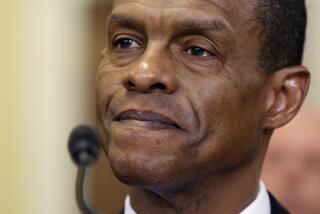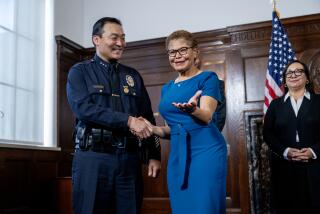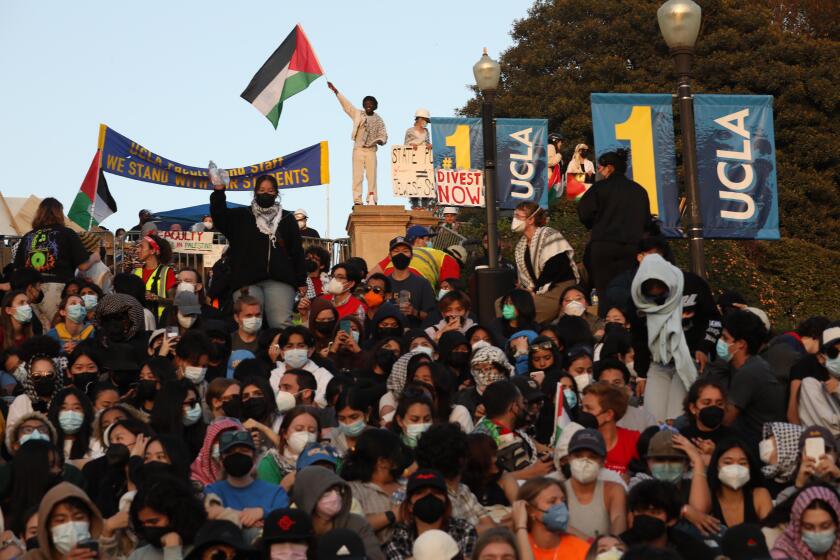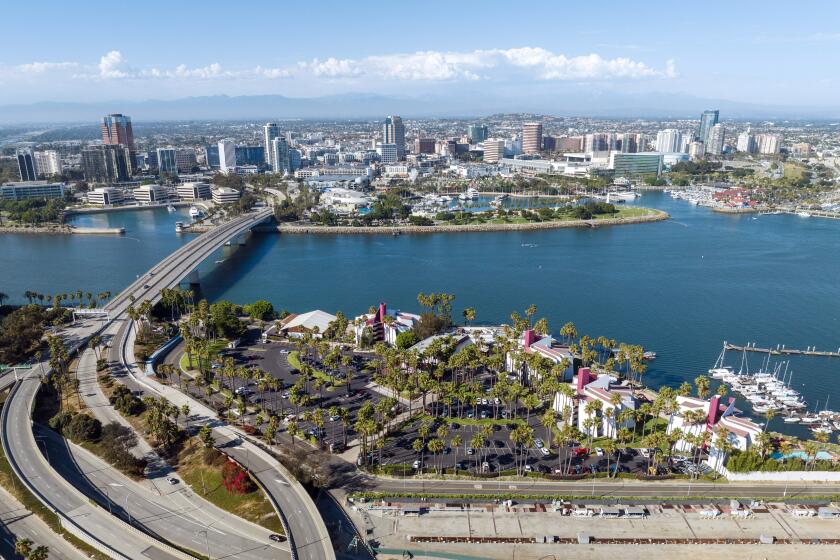All-civilian panels could review LAPD misconduct cases starting June 13
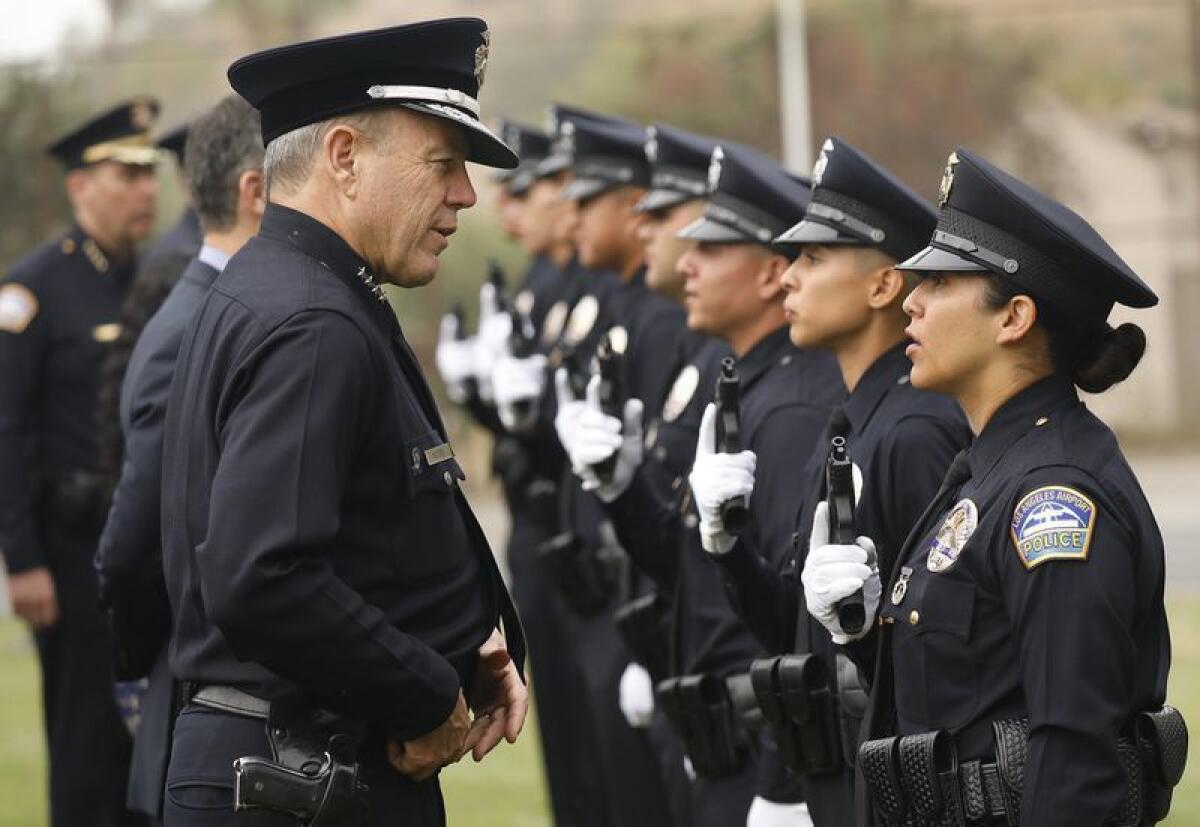
The Los Angeles Police Commission on Tuesday finalized qualifications for residents who will serve on the powerful boards that review serious officer misconduct.
Beginning June 13, officers can choose to have a Board of Rights panel made up of three civilians review their discipline case or select a board with the current makeup of one civilian and two LAPD Los Angeles Police Department command staff members.
The change — one of the most sweeping expansions of civilian oversight in decades — comes after voters in 2017 approved Charter Amendment C, which gave officers the all-civilian option despite opposition from civil liberties groups that argued that civilians tend to be more supportive of officers. The City Council formalized the measure in April.
A key question has been what qualities and experience civilian board members should possess and how to ensure they represent the geographic and ethnic diversity of the city.
To recruit a diverse group of new examiners, the Police Commission, the civilian panel that oversees the department, set out guidelines that include advertising on social media and with neighborhood councils and local bar associations.
“Hopefully, we will be able to increase the diversity of the pools,” said Richard Tefank, the commission’s executive director.
Police Chief Michel Moore said he is looking forward to seeing how the “all-civilian” panels perform.
“I am following the reform of our discipline process very closely, as civilian oversight and input continues to be a cornerstone of policing in the city of Los Angeles,” Moore said in a statement. “I am confident the Board of Police Commissioners understands how important these positions are and will carefully select individuals who are most qualified to fill the position.”
In the current disciplinary system, once a complaint against an officer is initiated, it is investigated and rises through the chain of command up to the chief. If an allegation is sustained, a commanding officer recommends discipline. The chief can either accept or modify the punishment.
If the officer disagrees with the punishment, the individual can appeal to the Board of Rights. The department and officers can call witnesses during a hearing. The panels will then issue a finding of guilty or not guilty and can either increase, adopt or reduce the chief’s recommended discipline.
In creating the all-civilian panels, the LAPD is entering uncharted waters. Only about 200 of the nation’s 18,000 police departments have any form of civilian review boards, according to Governing magazine.
Samuel Walker, professor emeritus of criminal justice at the University of Nebraska Omaha, said civilian panels have not resulted in widespread change to officer discipline. Community activists in other cities complain that members of civilian panels are easily co-opted by police and begin to see things from the officer’s perspective, he added.
“I have always regarded it as another impediment to accountability — another stop along the way to a final decision which creates the opportunity for mitigation of punishment,” said Walker, who has consulted on policing issues with the U.S. Department of Justice.
The new LAPD policy was controversial from the outset.
The structure of the panels was created in 1992 in the wake of reform demands after the beating of Rodney King and the riots that followed. At the time, many officers opposed the idea of civilians judging whether they should be suspended or terminated.
Police watchdogs assumed civilians would hold law enforcers more accountable.
But the charter amendment was backed by the powerful Los Angeles Police Protective League, which contends that officer-led panels — made up of top cops seeking to climb the ranks — are less likely to buck a chief’s recommendation of severe punishment. Council President Herb Wesson and Mayor Eric Garcetti also helped champion the measure.
The ordinance implementing the all-civilian panels is valid for two years. At that time, the LAPD will submit a report to the City Council to evaluate the effectiveness of the changes.
Several speakers urged the commission on Tuesday to reject the changes, calling them an “end around” to appease the police union. Commissioners did not respond.
Two commissioners will review the civilian applications and pick candidates to interview. The selection and training is expected to take 90 days. Training consists of an eight-hour course, during which the new examiners learn about rules of evidence and other procedures from city attorneys and internal affairs investigators. To serve, residents cannot have a criminal record or serious misconduct allegation at a job and must have at least two years of experience in areas such as human resources, personnel and labor relations.
The commission also prefers city residents and those who have a record of community service. Applicants for the board positions will have to submit to a background investigation.
More to Read
Start your day right
Sign up for Essential California for news, features and recommendations from the L.A. Times and beyond in your inbox six days a week.
You may occasionally receive promotional content from the Los Angeles Times.

